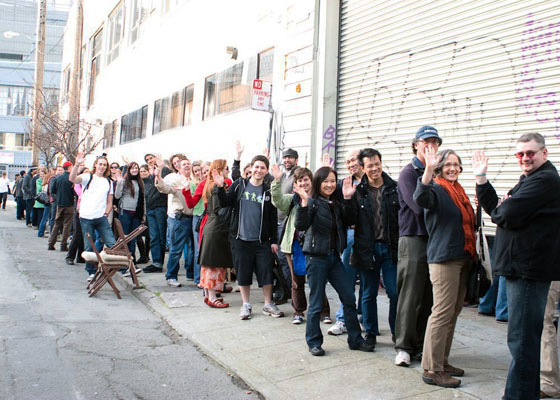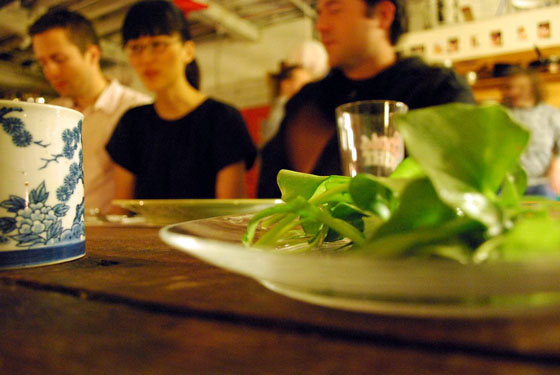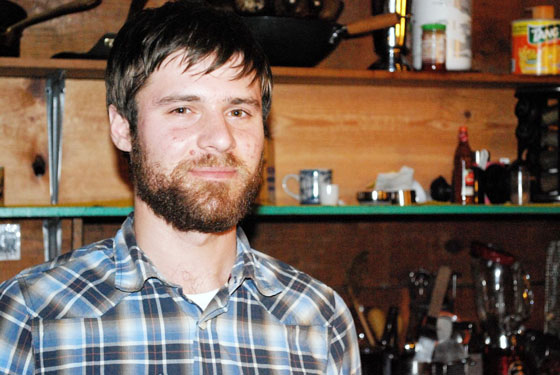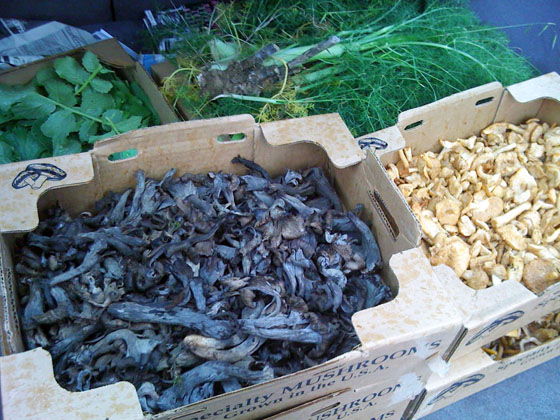“I realized that for rest of the year, you can forage too!” he says. Wild greens, acorns, and seaweed made it onto his short list of items to gather in the woods.
“I grew up in Vermont but I wasn't really a woods guy,” says Rabins. “It's cool when I go back now to visit my mom, I see so much more than I saw before. There are ramps everywhere!”
“Foraging gives you a real awareness of your surroundings. You notice things you'd never seen before.”
Rabins started a “CSF” (Community Supported Forage) box program, similar to a CSA box you’d get from a farm.
“I wanted to sell at the farmer's markets but people get freaked out by wild mushrooms,” he said. So then, he started the underground market. The event, which ran for eighteen months, was a space for people who are making food at home to be able to sell it. Morphing from a private house in the Mission, to which 150 people showed up to a 2,500 person private club held at Public Works, the underground market was eventually shut down by the Health Department.

Hungry patrons wait outside the Underground Market in 2010.
Three years ago, Rabins started the Wild Kitchen, a series of wild foraged underground dinners. Each of the eight courses focuses on a couple of wild ingredients that Rabins collects; he cooks with co-chef Thomas Martinez, formerly of Mission Beach Cafe and Bar Tartine.
The focus for Rabins and the rest of the forageSF crew now, is shifting toward an “incubator kitchen,” a concept Rabins is developing based off of the model of Tech Shop. For around $100 monthly, members can use industrial design equipment and receive help with their projects.
“Commercial kitchens aren't welcoming to non-professionals,” Rabins explains. “We all have these little apartment kitchens, which are not cohesive to cooking large amounts of food.”
Forage Kitchen is intended to be a “hub for food.” The shared-use commercial kitchen will have office space and offer consulting to people who are starting their own food businesses.
“When you're starting your own food business there is so much bureaucracy and red tape,” says Rabins. “There is so much hassle and you're generally trying to do it all on your own, so it's really disheartening.”
Forage Kitchen will be a space for people to work alongside each other. “People talk a lot about the food community in SF, but more realistically it's a lot of people doing the same stuff on their own in the same city,” Rabins says. A lot of small-business food entrepreneurs, Rabins says, know each other but don’t meet up. Being around others who “are going through the same stuff, and learning the same stuff” will be beneficial to both the small businesspeople and to the larger SF food community as a whole. Beyond Forage Kitchen being for small businesses, though, Rabins sees it as a welcoming space for individuals.
Though Forage Kitchen is still several months away from opening, Rabins is just starting to fundraise now. He hasn’t begun applying for any licenses yet but there is a space the foragers are eyeballing. “Think 10,000 square feet in SOMA, with space for a rooftop garden and a temperature-controlled room to hang meats and cure prosciutto,” Rabins says.

Diners will eventually enjoy the fruits of local labor at the Forage Kitchen.
Another dream is to have a “home brew room,” where novice brewmeisters can produce beer, and a café in front that will sell the wares made on site. When will this utopian place open? “Hopefully within a year,” Rabins says. “It’s amazing how difficult the city makes these things,” he sighs.
Though getting an independent food business off the ground in San Francisco can be filled with trials and tribulations, Rabins has persevered. His methods of success?
“I've always kept my business really light,” he explains. “If I was doing something, and it wasn't working, I could easily change course. I have tried to follow my interests the whole way."
"I think the most important thing to be successful is to follow your own passion.”
For now, Rabins is getting the word out about the Forage Kitchen through forageSF events like Wild-boar scavenger hunts, “Gypsy Jazz pig roasts,” and Basque family-style feasts. Although this weekend’s Basque feasts are sold out there will be future fundraising events to get the Forage Kitchen project off the ground. To be among the first to know about upcoming events subscribe to the forageSF email list.
Related Links:
forageSF: Health Department Blues
Bay Citizen: ForageSF Founder Accuses Health Department of Harassment (UPDATED)



